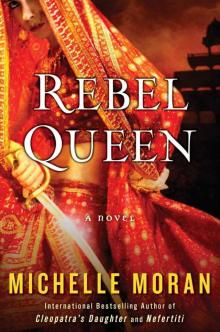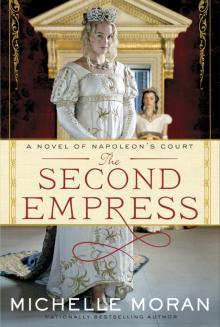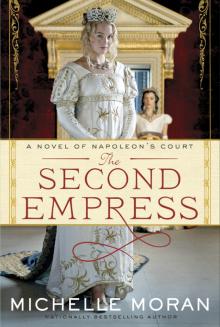- Home
- Michelle Moran
The Second Empress: A Novel of Napoleon's Court Page 22
The Second Empress: A Novel of Napoleon's Court Read online
Page 22
I look across the seat at my traveling companion, and Méneval is watching me curiously. I have known my husband’s secretary for more than five years, yet this is the first time we’ve been alone together. I wonder what he makes of his twenty-three-year-old empress, a woman who convinced the entire court of France to abandon Paris and take shelter within the Château de Rambouillet, held by the Austrians.
“How will the Allies treat him?” he asks.
“With more leniency than he deserves,” I say truthfully. “He’s an emperor. They won’t wish to make a martyr of him.”
“And you?”
I look out the window at the frenzy of horses and carriages. Women are already wearing white cockades on their breast, the symbol of Bourbon rule. “I will no longer be the empress of France. I know the Bonapartes will hope my father will restore me to the throne so I can replace what they have lost. But he will not.”
He is quiet for a moment, wondering what this will mean for him. “So where will Your Majesty go?” he asks.
I smile sadly. “Home.” Where I’ll be the woman who was once a regent of the first French empire. I’ll think of the palaces I’ve left behind, and the court that was once mine to oversee. I will have nothing when I return to Austria, perhaps not even my title. And when my son’s father remembers me, it will be as a traitor. But for all of these losses, I pray there will be gains.
I look down at Franz, and when I touch his blond curls, he leans back into my hand. “How long until we get there?” he wants to know, and I tell him it could be hours.
“Three?” He holds up five fingers.
I hold up ten.
WHEN WE REACH the gates of the Château de Rambouillet, there is gunfire in the distance, and Sigi barks wildly. Méneval moves back the curtains of our carriage. “There’s a flag,” he says quickly. Then he stares at me, disbelieving that this has really come to pass. “It’s red and gold.”
Yes. With a two-headed eagle! The Austrians have come. I hear the driver telling the guards that the empress of France has arrived with her suite. Then the gates are thrown open, and Méneval exhales.
“Calm yourself, Sigi,” Franz says, and I can hear Monsieur Laurent in his words.
The carriages roll in a long procession toward the torchlit courtyard. As soon as the horses stop, I tell Franz, “I want you to stay here and watch Sigi. Maman will return in just a few moments.”
I open the door, and before a single courtier can disembark, I am already searching. There are hundreds of soldiers, possibly thousands, all dressed in red and gold. A man with a white mustache comes up to me, but I don’t recognize him as someone from my father’s court.
“Your Majesty, the Empress?” he asks.
“Yes.”
“Someone has been waiting.” He steps back, and I see him. He is in uniform, with high black boots and white riding gloves. In his great feathered hat and long black cape, he looks like a true emperor. I run to him, and I don’t care that it’s undignified to embrace the emperor of Austria in front of so many men. “Vater!” I cry, and he takes me to his chest. “You came.” I weep. “You came.”
He strokes my hair. “Maria Lucia, my Maria Lucia. It was a promise.”
“Maman?”
I turn to see that Franz has left the carriage. He is looking up at me with his great blue eyes, a perfect miniature of my father. “This is Franz,” I say, making the introduction. “After his grandfather.”
My son executes a bow, exactly as he’s been practicing for more than an hour, and my father sweeps him off his feet.
“Franz!” he exclaims, and my son looks at me.
“It’s all right.” I laugh. “This is your Grossvater.”
My son wraps his little arms around my father’s neck and kisses his cheek. He looks like a Hapsburg king in his grandfather’s arms. And while my father hoists him into the air, I search the men behind him.
“He’s waiting for you inside.”
It’s been four years since he arrived with Sigi, and five years since he told me he’d come for me one day. I follow my father and son across the courtyard while the rest of my suite unloads their carriages. We enter the palace and pass through long halls until we reach a chamber filled with tables and maps, and there, by the fireplace studying a chart, is Adam Neipperg.
He’s more handsome than I remember, dressed in his military uniform. I pause at the door and wait. “Maria!” He leaps from his chair, and when he sees my father, he bows respectfully. “Your Majesty. I’m sorry. I didn’t see—”
My father waves his hand. “You should know that you were the first person my daughter asked for,” he says.
Adam looks at me, and all the tenderness we once shared is there in his face. He crosses the chamber and studies Franz. “Welcome to Rambouillet,” Adam tells him.
“Thank you, monsieur.”
Adam looks at me. “Exactly like his mother.”
Franz points to Adam’s black eye patch and asks, “Does it hurt?”
“Not at all. It’s a small sacrifice to serve one’s country,” Adam tells him.
“Can I have one?” My son is enchanted.
My father laughs. “Let’s hope not. It caused a great deal of pain for the count when it happened. Shall I take you into the nursery?”
“No!” Franz cries.
But I nod. “If you would.” I lean over and kiss my son goodnight, and he buries his face in my father’s chest. When they’re gone, I turn to Adam. “It is real, isn’t it?” I ask.
“Yes.” He steps toward me, and he’s standing so close that I can smell the heady scent of his cologne.
He reaches out and draws me to him. “I’ve waited five years for this moment, Maria, and nothing—not even the emperor of France—can stop me from doing this.” He kisses me deeply, passionately, and he’s right. The emperor of France does not stop him. I do not stop him, either. I close my eyes and think of François Boucher’s painting Fountain of Love.
I lie on the chaise while he locks the door and blows out one of the candles. Then he comes to me, and we share the kind of night I’ve never even dreamed about these past five years. I whisper to Adam of all that haunts me, of all that I’ve done, of all the ways I am no longer the same woman he knew. Then he puts his hands on me and reminds me of who I was, of who I want to be, and how we shall live our lives together now.
When the clock in the hall strikes twelve, we rise from the chaise. I watch him dress and am surprised that I’ve forgotten how lean he is, his muscles battled-hardened and ready. He helps me into my long silk gown, kissing my neck and promising me things Napoleon never promised Joséphine. Then he leads me through the halls to my chamber. When I invite him inside, none of the guards make any motion. Before Napoleon—and France and Metternich’s duplicity—there was Adam. He was my choice as well as my father’s.
On the bed, we undress each other for a second time, and when he reaches out for me, the last five years of my life drift away like a fog. I place my head on his chest and listen to the comforting rise and fall of his breath. His heart is beating quickly. “It’s strong,” I tell him.
“It plans to keep going for another thirty years, at least. Are you ready for that?”
I roll on top of him and hold him close. “Test me.”
I can’t remember when we fall asleep, but the next morning I awaken to the sound of bells. Adam is gone, and I’m sure the lady-in-waiting who has come to help me can smell his cologne on the sheets.
“Your father is waiting in the Grand Salon, Your Majesty. Apparently there is news.”
I change as quickly as possible—a pale blue dress with heavy silver embroidery—but there’s a knock at my door before I can leave. The lady-in-waiting announces my father.
“His Imperial Majesty, the Emperor of Austria.” She takes her leave, and I rise from my armoire to greet him.
“The Bourbon flag has been raised above the Tuileries Palace. Napoleon has abdicated.”
I think imm
ediately of my son, who will never again be the king of Rome, and of the Bonapartes, whose stars have finally fallen. “What does it mean?”
“Czar Alexander has gone to Fontainebleau with a treaty. If Napoleon accepts, he will remain an emperor.”
I gasp, but my father smiles.
“Over the island of Elba,” he adds. “He will return to Italy, where he belongs.”
I walk to the window overlooking the lake and am surprised to see that Adam and my son are feeding the ducks outside.
“In all of this,” he says quietly, “you’ve never once asked what will happen to you.”
I look up. His blond hair is now completely white, and fine lines have begun to form at his brows. “Franz is free from his father’s ambition. That’s all that’s important.”
He sighs, and I can hear the heartache of these past five years in his voice when he replies, “I have made sure you will keep your imperial rank. For the rest of your life, you will be known as the Empress Marie-Louise.”
“Maria Lucia,” I correct, and he nods.
“You will also be made the Duchess of Parma.”
I want to be sure I understand him correctly. “I won’t return to Austria?”
“You may remain in Austria for as long as you want,” he assures me. “But someday, mein Liebling, you belong at the head of a nation.”
I hear my son laugh and look down to see him chasing the ducks. It’s the most innocent scene in the world; a child playing in a garden, the bright April sunshine gleaming from his hair. But he won’t be a child forever. What will his inheritance be? How will he take his place in the world? “What if Napoleon doesn’t sign? He told his brother he would rather see our son’s throat cut than in the hands of his enemies.”
“He will sign,” my father says, disgust in his voice. “The Bonapartes will not trouble Europe again.”
CHAPTER 29
PAULINE BORGHESE
Villa Lozère, southern France
“My destiny is the opposite of other men’s. Other men are lowered by their downfall, my own raises me to infinite heights.”
—NAPOLEON
BECAUSE IT’S IMPOSSIBLE TO BELIEVE, I SIT IN THE SALON of the Villa Lozère and ask Paul to describe it again.
He leans forward, then puts his head in his hands. “I’ve already told you twice.”
“I want to hear it again!” I tighten the silk robe de Canouville bought for me, and shiver.
“He signed the Treaty of Fontainebleau,” he repeats. “I was there. I know he signed it.”
“And Paris is filled with Cossacks?”
“Yes.”
Then it’s the first foreign army in Paris since the Hundred Years’ War. I close my eyes and can hear Paul sigh.
“Do you know when you and I were supposed to leave France?” he asks quietly.
God, not this.
“Two years ago,” he says.
I open my eyes. “And the world has descended into war since then!”
“Europe has. Not Haiti.” He rises, and I panic.
“Where are you going?”
“To prepare for your brother’s arrival. And unless you would like to greet him in your robe, I suggest you do the same.”
“You can’t speak to me like this!” I shout. “I’m the Princess Borghese. You love me.” But he’s already gone. “You owe everything to the Bonapartes!” I scream after him. And if not for me, you’d be at the bottom of some nameless grave with your parents.
I go to the armoire and wonder if maybe I really should greet him in my robe. What does it matter anymore? The Bonapartes have fallen, just as our most bitter enemies predicted. Who will see if I’m dressed in a batiste gown or a silk robe now? He’s the emperor of Elba! In Europe, I hear they’re rejoicing in the streets, and this morning some ungrateful traitor left a British newspaper on my doorstep. It was open to a cartoon of my brother on a mule, and beneath it was a poem:
A lesson to mortals regarding my fall:
He grasps at a shadow, by grasping at all.
My course it is finish’d, my race it is run,
My career it is ended just where it begun.
The Empire of France no more it is mine.
Because I can’t keep it, I freely resign.
He should have punished French dissidents harder. Robespierre would never have allowed such freedom of the press. It obviously wasn’t enough to exile the likes of Madame de Staël or to ban Tacitus. I reach for my simplest muslin dress and a few pearls for my neck. I study myself in the mirror when I’m finished, and don’t recognize the woman I’ve become. She’s so small and thin, with nails that are bitten down to the quick. When did that habit start? Probably when de Canouville died.
I take up my white shawl and fasten it around my shoulders. If only Napoleon had marched on Egypt instead. In Egypt, I would have made a magnificent queen. I reach for my réticule. How did it come to this? There’s the sound of a horse and carriage outside, then a small commotion as soldiers shout in German. I pinch my cheeks to give them some color, then bend double with pain.
This will not be our last meeting. I will never agree to abandon my brother to some island in the Tyrrhenian Sea. But as I descend the stairs, my confidence falters. He is dressed in a stained green uniform, with faded epaulettes and blue pantaloons, his hair uncombed, his beard unshaven …
“Paoletta,” he whispers.
He is standing with Paul. Behind them is assembled every courtier who came with me to Villa Lozère. I take the last steps slowly, and when he reaches out to embrace me, it is all I can do to remain standing. We weep in each other’s arms. How pitiable the Bonapartes have become. He smells of snuff, and I imagine I smell heavily of wine. The angels themselves would weep if they could see us. “Let me go with you,” I beg him.
“You will return to Italy,” he says bravely, “and you will take Maman with you.”
“What is there for me in Italy?” I cry.
“Camillo.”
“He is at Château de Neuilly, searching for the Borghese family paintings and jewels.”
Napoleon raises his brows. “Will he find them?”
I smile through my tears. “What do you think?”
We look at each other in our miserable states, and there is something almost comical in our wretchedness. For more than a decade, we ruled the world. No family rose higher than the Bonapartes. And then came Russia—frozen, powerless, meaningless Russia. “What will I do without you?” I ask, and my tears come fresh.
“Write. Perform.”
“Then in six months,” I say, “when everything is settled, I will come to Elba and bring Maman.”
He hesitates. This exile is real, and it won’t last for a week, or two months, but a lifetime. “Six months then,” he replies, and I hold him tighter. My God, what will we do without him?
“Have something to eat,” I encourage, but he looks back. Soldiers have filled the hall, and I can see them outside, surrounding the villa.
“No,” he says sadly. “It’s an eight-day trip from Paris to Fréjus, and my ship is waiting.” He is trying for humor, but I can’t bear it.
“I will come to the port.”
“Absolutely not. Pauline, they are rioting. It is Marseilles all over again.”
When the Revolution came to Corsica, our little island had been ruled by the French for only twenty years—it wanted no part in the French king’s execution. Corsican leaders declared the island’s secession, and they accused our family of not loving Corsica enough. We were too French. So we fled to Marseilles, where different horrors awaited. For a year we watched the guillotine at work, and no one was safe from the anger of the mobs. “This is what happens when a government fails,” Napoleon said. Now it is his government failing.
“I know what it is to be in danger,” I tell him, “and I am coming.”
I do not wait for a reply. I return to my room and gather what I can. Paul helps me pack a small trunk. “I want you to sell everything,” I t
ell him in the privacy of my chamber, “exactly as we planned. Even the paintings.”
“And if they ask—”
“I have as much right to them as Camillo.”
He lifts my trunk and moves toward the door, but I step in front of him. There isn’t the same look of adoration in his eyes as he once had for me. “Have I changed?”
He watches me carefully. “How?”
“Do you think I’ve lost my looks?”
He narrows his eyes and moves to step around me, but I won’t let him.
“You can be honest!” I exclaim. “I know you don’t see me the same way—”
“Because you’re not.”
I inhale. “What do you mean?”
“Have you changed? Yes. From a wide-eyed girl in sandals and flowers to a woman in diamonds and furs.”
I hold up my hands. “There’s not a single diamond on my body!”
“Maybe not today. But how about yesterday, and all the days before that?”
“But it isn’t my looks?”
He breathes deeply. “You can’t help it, can you?”
“What?” A German soldier appears in the doorway. It’s time to leave, but I want to know what it is that I can’t help.
“Your selfishness is unbearable,” Paul says, and the soldier steps aside to let him pass.
I look at the young German. There is definite admiration in his gaze. Selfishness? There is no greater act of kindness than this! Even Hortense would agree.
I join my brother downstairs. Once I’ve retrieved Aubree, he escorts me into his coach. This will be the last time I will ever ride in an imperial carriage. I look up at the pale silk lining and run my fingers over the velvet cushions. The long procession of military carriages rolls out the gates, and my brother looks tense. “Prepare yourself” is all he says.
We ride through the streets, and nothing seems changed to me.

 Madame Tussaud: A Novel of the French Revolution
Madame Tussaud: A Novel of the French Revolution Cleopatra's Daughter
Cleopatra's Daughter Rebel Queen
Rebel Queen The Second Empress: A Novel of Napoleon's Court
The Second Empress: A Novel of Napoleon's Court Mata Hari's Last Dance
Mata Hari's Last Dance Nefertiti
Nefertiti The Heretic Queen
The Heretic Queen The Egyptian Royals Collection
The Egyptian Royals Collection Cleopatra’s Daughter: A Novel
Cleopatra’s Daughter: A Novel The Second Empress
The Second Empress Madame Tussaud
Madame Tussaud